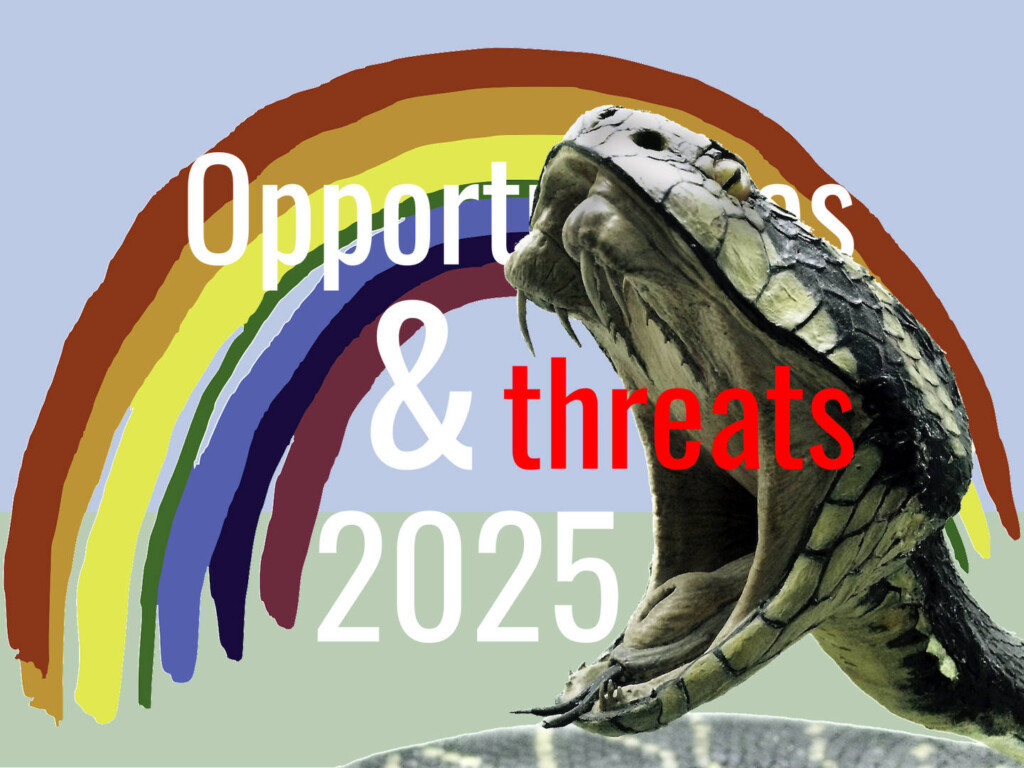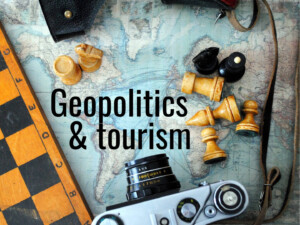What is tourism’s biggest opportunity and/or threat where you are in 2025?

What is tourism’s biggest opportunity and/or threat where you are in 2025?
It’s a “Good Tourism” Insight Bites question.
Your correspondent put the question to the travel & tourism stakeholders in the “GT” network, inviting responses of no more than 300 words. (You too can join the “GT” network. Register.)
Bites menu
- Europe: ‘Get serious about air transportation’
- Southeast Asia: Opportunities for sustainable, regenerative tourism
- ‘Oh Canada, we stand on guard for thee’
- Asia’s ‘persistent threat’ and ‘immense promise’
- Trump and climate change
- Destinations must prioritise the needs of communities, environment
- Climate change will push many ‘over the cliff’
- Threat and opportunity in Barcelona
- Ecotourism and the threat of overtourism in southern Thailand
- Responsible travel trends and the threat of overtourism in Cambodia
- Opportunity and threat in the Golden Triangle
- What do you think?
- Featured image (top of post)
- Previous “GT” Insight Bites
Europe source markets: ‘Get serious about air transportation’
Robin Boustead, Founder, Great Himalaya Trail, Nepal
As the spotlight of greenhouse gas (GHG) emissions pivots to tourism, through COP29 and the evolving environmental, social, and governance (ESG) sector standards for the European Union (EU) Corporate Sustainability Reporting Directive (CSRD), I can’t help feeling that sustainability is both the greatest threat and opportunity the industry faces.
It’s time for tourism to get serious about air transportation: Tax subsidies or exclusions must go; GHG emissions must be hard-priced in; and fares must rise. Basically there must be parity — a level-playing field — with land-based transport. If that means the end of ‘cheap airfares’ then so be it, we simply cannot continue to justify exempting one of the largest contributors (by industry) of GHG emissions from doing its fair share to remedy a global challenge.
But herein also lies opportunity, most probably with the assistance of AI, to rethink, re-jig, re-form, and transform our sector in ways that until now were beyond reach, if only because we didn’t have the will. Now there are new tools presenting clear pathways towards sustainable travel development that are simple to scale and have global outreach.
The EU is still the single largest and highest value source market for international visitor arrivals, and the ‘rules’ EU tourism companies must abide by are changing. This will affect all destinations and change the way travel operators, hospitality companies, and transporters do things and account for their impacts.
These changes cannot be negotiated by lip-service alone. Many online travel agents and large tour operators have anticipated the inevitable and are fully prepared to meet the demands of value-chain integrity. Those who insist on maintaining business-as-usual will be in for a shock. The world is changing and it will change quickly.
Southeast Asia destinations: Opportunities for sustainable, regenerative tourism
Kevin Phun, Founder & Director, The Centre for Responsible Tourism Singapore
I see compelling opportunities for new sustainable and regenerative tourism experiences in Southeast Asian destinations for these three reasons:
- There is an increasing appetite for public-private partnerships in sustainable tourism; a willingness for governments and businesses to work together to explore solutions to tourism’s sustainability issues. For example, the Malaysian Hotel Association is working with the private sector to engage hotels on ESG concepts endorsed by the Ministry of Tourism, Arts and Culture. In Vietnam, the tourism industry is realising that public-private partnerships could be the “golden key” to unlocking sustainability.
- There is more high-level conversation about regenerative tourism (whether or not it is well understood). At the 11th Asia-Pacific Economic Cooperation tourism ministers meeting in 2022, the 21 members agreed that regenerative tourism should be the goal for future tourism to and within APEC. Furthermore, Thailand will host Asia’s second Tourism Cares summit in 2025 to raise awareness about regenerative tourism. Vietnam is also starting to talk about regenerative tourism practices.
- Southeast Asian destinations have taken bold steps to introduce new tourism experiences. In an era of overtourism, it is indeed heartening to see the emergence of new tourism experiences that bring economic and non-economic opportunities to stakeholders who often otherwise do not benefit much from tourism. An example is co-created food tourism products in regional Thailand.
New sustainable and regenerative tourism experiences need not be focussed on pandering to the whims of visitors. But they absolutely should deliver new revenue streams to destinations, incomes for communities, and resources for the preservation or restoration of culture and heritage and the introduction or upgrade of critical public services.
[CRTS is a valued “Good Tourism” Partner.]
‘Oh Canada, we stand on guard for thee’
K Michael Haywood, publisher, ‘Destinations-in-Action’, Canada
Following the pandemic I was quick to reveal how tourism should be re-imagined and enabled. Now, as we enter 2025, the renewal of opportunities for tourism seems bleak. It’s not that Canadians are pessimists, but that their tragic optimism is being challenged.
Once friendly neighbors are saber-rattling. With the incoming US president demanding tighter border restrictions, promising a 25% tariff on Canadian exports to the US, dissing our elected officials, and referencing our country as a “state” (possibly his 51st state), it has become clear that the MAGA (Project 25) movement is about to shatter well-established norms of democracies, alliances, and interconnected economies and supply chains throughout the world.
With a possible pull out from NATO, and providing a playbook for authoritarianism, our world is on the brink of becoming less safe and less democratic. Factor in the GOP’s disbelief in climate change; a “drill baby drill” policy to expand the demand for fossil fuels; a wholesale removal of undocumented immigrants; and a dismantling of institutions, their norms, rules, and regulations, what do you expect will happen?
Throughout North America, there will be labour shortages, disruptions to industry supply chains, a revival of inflation, higher costs for transportation, housing, and food. In Canada, there will be a further devaluation of our dollar, a pullback of investment in new businesses, continued uncertainty, and a postponement or denial of the future we want.
Given the Canadian dollar’s devaluation, Canada will remain attractive to international visitors, especially from the United States … if they come. Domestic and outbound tourism, however, is unlikely to expand as travel costs are becoming exorbitant for many. Investment opportunities in tourism, however, might respond favorably.
Overall, Canadians certainly aren’t looking forward to a tumultuous four years or more.
Asia’s ‘persistent threat’ and ‘immense promise’
Willem Niemeijer, CEO, YAANA Ventures, Thailand
Two powerful forces will shape the tourism industry in 2025: the opportunity for visitor dispersion and the persistent threat of geopolitics.
Visitor dispersion holds immense promise. Iconic destinations in Asia, such as Angkor Wat and Bali, continue to captivate global attention, but overtourism threatens both the environment and cultural heritage in these locations. By encouraging travellers to explore beyond high-traffic areas, we can alleviate pressure on these sites while unlocking economic potential in lesser-known regions.
Countries like Thailand, Cambodia, and Indonesia are brimming with hidden gems: pristine islands, remote temples, vibrant communities, and rich traditions waiting to be shared. Dispersion enables a broader distribution of tourism revenue, empowering local economies and offering travellers deeper, more authentic experiences.
At YAANA Ventures, we are doubling down on this approach in 2025, creating sustainable travel and hospitality opportunities that celebrate Asia’s diversity while championing environmental stewardship.
Geopolitics, however, looms as a significant challenge. Shifting power dynamics, rising protectionism, and economic uncertainties are disrupting global travel flows. Conflicts, sanctions, and strained diplomatic relations can hinder access, deter travellers, and complicate the seamless journeys that make tourism appealing. These instabilities often lead to inflation and supply chain disruptions, further straining the industry.
The tourism industry must embrace resilience and innovation to overcome these challenges and ensure that tourism remains a force for good: connecting cultures, preserving nature, and fostering shared prosperity.
Trump and climate change
Richard Butler, Emeritus Professor, University of Strathclyde, Scotland
Donald Trump possibly represents both a threat and an opportunity because of the unknown elements he might introduce, and the proximity of Canada to the US.
Otherwise, threats from climate change in already hot areas may give temperate regions an opportunity to attract outdoor enthusiasts, while climate change-related restrictions on travel may mean long haul destinations, and places usually reached by a second flight from aviation hubs, may lose out.
Destinations must prioritise the needs of communities, environment
Edwin Magio, PhD Research Student, Leeds Beckett University, UK
Tourism today faces significant threats and trends that can have various impacts on the industry. These challenges include, but are not limited to, climate change, overtourism, technological advancements, wildlife loss, safety and security, and inequality and exclusion.
While these issues create obstacles for the tourism sector, they also offer opportunities to redefine the future of tourism.
Destinations are best placed to mitigate threats and take advantage of opportunities through the development of strategies, policies, laws, and regulations based on the goal of a sustainable future for tourism.
It is essential that these efforts prioritise the rights and interests of local communities and their environments, ensuring that both can thrive. This is not just a temporary solution but a long-term commitment to creating a more sustainable tourism industry.
Local communities play a vital role in the sector as they host tourists and operate local businesses. Therefore, including their interests and preserving their natural and cultural heritage is essential for fostering sustainable and inclusive tourism.
The power to drive transformation lies with the destinations themselves. Whether tourism evolves to address these challenges or remains stagnant will depend on the actions taken at the destination level.
Therefore, every destination must prioritise the needs of its community and the environment in tourism development, management, and promotion. Without this focus, the future of tourism in those destinations remains uncertain.
Climate change will push many ‘over the cliff’
Wolfgang Georg Arlt, CEO, COTRI (China Outbound Tourism Research Institute); Director, Meaningful Tourism Center, Nepal
I am on a planet called Earth, or Sol 3. Looking at a more narrowly defined location does not make much sense anymore in times of global climate change.
The heating of the planet and the increase of unpredictable serious weather occurrences like floods, storms, heatwaves, droughts et cetera, threatens more and more traditional business models for the tourism industry around the globe.
Tourism will have to move indoors in many areas.
The prospect of maybe facing 50°C heat at the beach, in the city centre, or on a hiking trail; or having no snow for skiing; or no or too much wind for sailing, et cetera, will push many companies and destinations over the cliff.
That’s if they do not change fast enough. That’s if they do not use Meaningful Tourism as a tool to develop a new sustainable form of tourism.
Threat and opportunity in Barcelona
Saverio Francesco Bertolucci, Business Development Specialist, VDB Luxury Properties, Spain
The biggest threat to tourism in Barcelona is poor capacity management. A lack of hospitality development projects in the Catalan capital combined with laws abolishing holiday apartment rentals is causing dire socio-economic effects.
The biggest opportunity for tourism in Barcelona is and will always be its varied events that are well spread across the four seasons. Trade shows, conferences, fairs, concerts, and local festivals contribute to the internationalisation of the town and its worldwide reputation, attracting important minds and thousands of curious attendees.
Ecotourism, sustainability, and the threat of overtourism in southern Thailand
Chris Kittishinnakuppe, Head of Marketing & Sales, VHG Hospitality Asia, Thailand
Anurak Lodge’s most significant opportunity lies in its commitment to ecotourism and sustainability. As travellers become increasingly conscious of their environmental impact, Anurak’s focus on responsible practices can be a significant draw. Key initiatives include:

- Community-based tourism: Supporting local initiatives.
- Conservation: Engaging in ongoing projects like the Rainforest Rising Tree Planting initiative and participating in wildlife protection and habitat restoration.
- Eco-friendly practices: Reducing waste, using renewable energy, and minimising the lodge’s carbon footprint.
By highlighting these efforts, Anurak Lodge can attract eco-conscious travellers who seek authentic experiences and are eager to support sustainable destinations.
The biggest threat to Anurak Lodge in 2025 is the potential for overtourism and its associated environmental consequences. As Khao Sok National Park gains popularity, the increased number of visitors could strain resources and negatively affect the fragile ecosystem. This may result in:
- Environmental degradation: Pollution, deforestation, and disturbances to wildlife.
- Crowding and congestion: Diminishing the quality of the visitor experience.
- Damage to local culture: Overcrowding and commercialisation could erode the authenticity of the destination.
To mitigate these risks, Anurak Lodge advocates for responsible tourism practices and collaborates with local authorities to manage visitor numbers and protect the environment.
By embracing its commitment to ecotourism, and proactively addressing the challenges of overtourism, Anurak Lodge can continue to thrive in 2025 and beyond, offering visitors a unique and sustainable experience while preserving the beauty of Khao Sok National Park.
[VHG-affiliated Anurak Community Lodge is a valued “Good Tourism” Partner.]
Responsible travel trends and the threat of overtourism in Cambodia
Chris Kittishinnakuppe, Head of Marketing & Sales, VHG Hospitality Asia, Thailand
Cardamom Tented Camp’s commitment to eco-friendly practices and conservation efforts aligns with the growing trend of responsible travel, representing a great opportunity in 2025 and beyond. This approach could attract eco-conscious tourists seeking authentic experiences while contributing to the protection of the Cardamom Mountains.

Overtourism is the biggest threat. The rising popularity of ecotourism in Cambodia may lead to overcrowding and environmental degradation. This could harm the unique experience provided by Cardamom Tented Camp and undermine its conservation initiatives.
To mitigate that threat we can focus on:
- Capacity management: Implement a strict booking system to keep visitor numbers within a sustainable carrying capacity.
- Community engagement: Involve local communities in tourism development and conservation efforts to promote ownership and minimise negative impacts.
- Environmental monitoring: Continuously assess the ecological impact of tourism, and adjust operations as necessary.
By leveraging the opportunity presented by sustainable tourism and proactively addressing the threat of overtourism, Cardamom Tented Camp can continue to offer visitors a unique and enriching experience while playing a vital role in conserving this precious ecosystem.
[VHG-affiliated Cardamom Tented Camp is a valued “Good Tourism” Partner.]
Opportunity and threat in the Golden Triangle
Chris Kittishinnakuppe, Head of Marketing & Sales, VHG Hospitality Asia, Thailand
The most significant opportunity for Visama Mae Chan in Thailand’s Chiang Rai province is its proximity to the Golden Triangle. It is a unique selling proposition. The Golden Triangle’s rich history, including of the opium trade, and its location at the convergence of three countries (Thailand, Myanmar, and Laos), offers visitors a unique and intriguing experience.

Visama Mae Chan can capitalise on this location by highlighting the Golden Triangle’s rich history and cultural experiences, such as providing tours to local villages and traditional handicraft workshops, and cultural activities.
Overtourism at popular sites in the Golden Triangle could spill over into Visama Mae Chan, negatively impacting the local community and environment. To mitigate this threat, Visama Mae Chan needs to:
- Develop a sustainable tourism plan: This plan should focus on preserving the area’s natural and cultural resources, managing visitor numbers, and ensuring that tourism benefits the local community.
- Promote responsible tourism: Initiatives could include educating tourists about customs, traditions, and the environment, and how to best support local businesses.
- Diversify tourism offerings: By providing various activities and experiences, Visama Mae Chan can attract a broader range of visitors and distribute the economic benefits of tourism more widely.
By carefully managing tourism growth and advocating for responsible practices, Visama Mae Chan can ensure that tourism remains a positive force for locals and the environment.
[VHG-affiliated Visama Mae Chan is a valued “Good Tourism” Partner.]
What do you think?
In a comment below share your own thoughts about the threats and opportunities for tourism where you are. SIGN IN or REGISTER first. (After signing in you will need to refresh this page to see the comments section.)
Or write a “GT” Insight or “GT” Insight Bite of your own. The “Good Tourism” Blog welcomes diversity of opinion and perspective about travel & tourism, because travel & tourism is everyone’s business.
This is an open invitation to travel & tourism stakeholders from any background to share their thoughts in plain English with a global industry audience.
“GT” doesn’t judge. “GT” publishes. “GT” is where free thought travels.
If you think the tourism media landscape is better with “GT” in it, then please …
Featured image (top of post)
What is tourism’s biggest threat where you are in 2025? Cobra image by P Schreiner (CC0) via Pixabay. And what is tourism’s biggest opportunity where you are in 2025? Rainbow image by Clker-Free-Vector-Images (CC0) via Pixabay.
Previous “GT” Insight Bites
- “GT” Insight Bites: Nostalgia
- “GT” Insight Bites: Geopolitics and tourism
- Tourism stakeholders: Who has an outsized voice? Who has no voice? Who cares?
- Would you abolish taxes on tips?
- Three critics walk into a bar …
- How are emerging technologies transforming the travel & tourism industry?
- What does it mean to be critical of tourism?
- What constitutes ‘progress’ for travel & tourism in 2024?
- Considering a career in tourism? Important things you should know in 2024
- What did tourism learn from the COVID-19 pandemic?
- In 2024, what are the best opportunities for tourism over the next five years?
- Tourism’s biggest challenges & threats over the next five years to 2028
- On empowerment, promotion, and the power of expression
- On enrichment, repatriation, the double-edged blade, and war
- On tourism technology, progress, and local benefit-sharing
- Hey, travel & tourism, are you ‘neocolonialist’?
- Who’s the new boss? Asia Pacific tourism industry association seeks leader
- ‘The hospitality industry offers a great career.’ Really?
- Cruise ships: Blessing or blight?
- Tourist vs traveller: What’s the difference?
- The heads of finance, operations, and PR walk into their boss’s office …
- Yes, Tourism Minister
- What are tourism’s biggest challenges & threats over the next five years?
- ‘Tourism is built on the backbone of white supremacy’. What do you think?
- Really, what’s the difference? ‘Sustainable tourism’ vs ‘regenerative tourism’
- Want a career in tourism? Important things you should know
- Diverse perspectives on travel & tourism and a fairer world
- Diverse perspectives on economic degrowth and tourism
- Diverse perspectives on visitor dispersion













